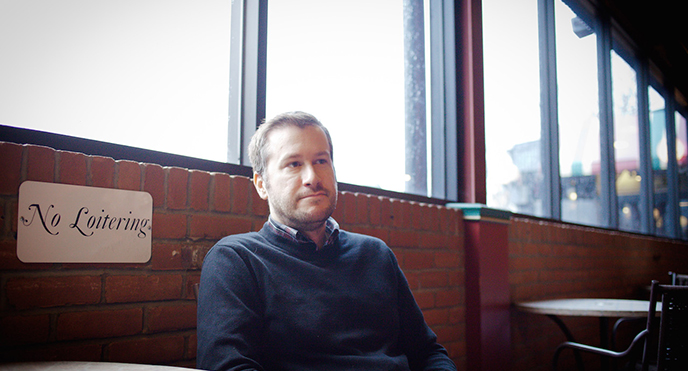It’s hard for us humans to accept truth when it’s unexpected—this is the cause of all conspiracy theories, I suspect. Look at 9/11. We have video evidence, jets flying into towers. But the truth is so audacious, so unexpected, even today some people refuse to believe it happened. Jet fuel can’t melt steel beams!
The secret to my novel, The Great Forgetting, is ludicrous. I’m not going to spoil it for you here but it has to do with altered chronology and suggests everything you believe about history is untrue. It’s absolutely absurd. And as a writer I was confronted with two major obstacles:
1. Finding a logical way for my characters to accept this truth.
2. Making it believable for the reader.
 |
There’s a point early on where the protagonist, Jack Felter, visits a boy in a mental hospital. The boy, Cole, has information Jack needs—information about the location of his friend, who disappeared after ranting about chemtrails in the sky—but Cole doesn’t just tell him everything he needs to know. Instead, he makes Jack play a game called “The Seven Impossibilities.” The point of the game is that there are seven unbelievable things that Jack needs to accept before he can understand what happened to his friend. It starts small, with the admission that Cole has a photographic memory. But the ideas get crazier and crazier—the government is putting mind-altering drugs in our drinking water, there are secret codes on the back of highway signs—with each of these ideas representing baby steps toward a shocking truth. It’s a gradient, a foothill of the mind that Cole must lead Jack over before the most unbelievable mystery can be revealed.
We have understood this about ourselves for a very long time, of course. Fifteen hundred years ago, Plato wrote about some people who were held prisoner in a cave, forced to stare at shadows on the wall until the shadows became their reality. What would happen if they were set free? What would happen if their chains were removed and they were lead out of the cave, into the light, to see the world in all its colors and dimensions? The answer is, They would go crazy. They would refuse to believe it and they’d fight you, or beg you to chain them up again. If you really hope to bring someone to an unexpected truth, it’s a long journey out of the cave. You’ll need to hold their hand and walk slowly.
You don’t teach a kid calculus until they understand basic mathematics, after all. For another example, consider how daunting it is to explain global warming to a country that teaches intelligent design in science class.
This defect of the human condition—the stubborn mistrust of blatant truth—has been understood and exploited by fiction authors for centuries. To believe the fantastic, the author first works to gain the reader’s trust by dispensing little truths through small character-building scenes. If Stephen King told you on page one of It that there was an alien living under Derry that looks like a spider, but pretends to be a clown, and can only be defeated by a group of kids who decide to have an underage orgy (yes, that happens) you would call bullshit. That’s why It is over a thousand pages long. There’s a lot of trust to earn first.
The best writers, of course, learn to do this with economy. Rod Serling of The Twilight Zone only needed a half hour to make us believe in gremlins enough to check the wings every time we’re on a cross-country flight. Ray Bradbury only needed 46,118 words to make us believe in a world where firefighters burn books. L. Ron Hubbard, on the other hand, was such a bad writer that when he couldn’t make us believe in aliens after ten books, he invented a religion to do it for him.
Which is all to say I admire writers who can still make us believe. It’s tricky because it’s against our very nature to ever do so.
James Renner is the author of a previous novel, The Man From Primrose Lane, published in 2012. He teaches composition at Kent State University and is a contributor to BoingBoing, Cracked, and Cleveland Scene.
YOU MIGHT ALSO LIKE:
The Writer’s Privileged Addiction: Retaining the Craft by Ceridwen Dovey
Dickens, Brick Collectors, and Unusual Leisure, by Stephen Jarvis
The Other Side of the Wall by Sloane Crosley

